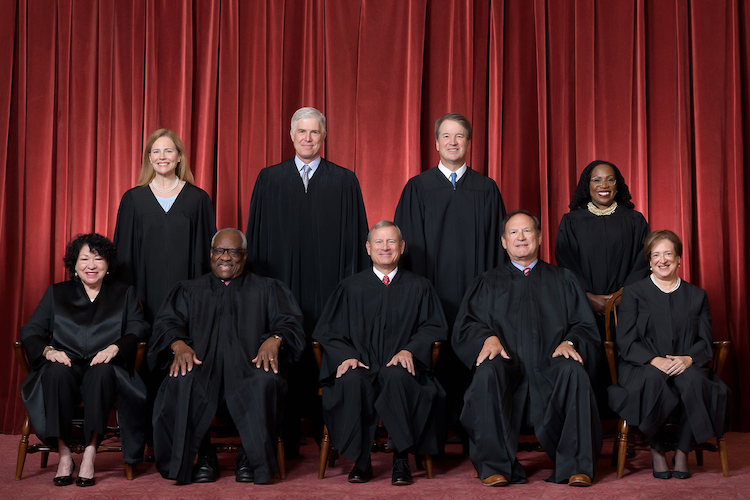
The formal group photograph of the Supreme Court as it was been comprised on June 30, after Justice Ketanji Brown Jackson joined the Court. The Justices are arranged by seniority, with five seated and four standing. Seated from left are Sonia Sotomayor, Clarence Thomas, Chief Justice John G. Roberts, Jr., Samuel A. Alito, and Elena Kagan. Standing from left are Amy Coney Barrett, Neil M. Gorsuch, Brett M. Kavanaugh, and Ketanji Brown Jackson. Photo: Credit: Fred Schilling, Collection of the Supreme Court of the United States.
The U.S. Supreme Court has set December 5 as the date to hear oral arguments in the case of a Colorado web designer who wants to refuse to create wedding websites for same-sex couples.
Lorie Smith, owner of 303 Creative, wants to expand her wedding business but says serving same-sex couples would violate her conservative Christian beliefs and her free speech rights.
Smith filed suit in 2016 challenging Colorado’s LGBTQ-inclusive nondiscrimination law.
She lost at the federal district court and appeals court levels.
The Supreme Court agreed in February to hear her case but only on the free speech claim. It announced the date Tuesday.
Jon Stewart interviews Arkansas attorney general on anti-trans law
Smith is represented by the Alliance Defending Freedom, an anti-LGBTQ+ legal nonprofit.
The ADF also represented Colorado baker Jack Phillips, who in 2018 won a measured victory at the high court.
Phillips had refused to create a custom wedding cake for a same-sex couple, and the Colorado Civil Rights Commission found that he had violated the state’s antidiscrimination law.
The Supreme Court vacated the commission’s judgment against him, saying commissioners had shown bias against his religious beliefs, but it did not establish a broad right to discriminate.
Jennifer Pizer, chief legal officer at Lambda Legal, recently told the Washington Blade that “an immeasurably huge amount is at stake” in the 303 Creative case.
“This contrived idea that making custom goods, or offering a custom service, somehow tacitly conveys an endorsement of the person — if that were to be accepted, that would be a profound change in the law,” Pizer said. “And the stakes are very high because there are no practical, obvious, principled ways to limit that kind of an exception, and if the law isn’t clear in this regard, then the people who are at risk of experiencing discrimination have no security, no effective protection by having a nondiscrimination laws, because at any moment, as one makes their way through the commercial marketplace, you don’t know whether a particular business person is going to refuse to serve you.”
The Supreme Court now has a 6-3 majority of conservatives, including three justices appointed by Donald Trump. That led to the overturning of Roe v. Wade, the 1973 decision that guaranteed abortion rights nationwide, in June’s Dobbs v. Jackson Women’s Health Organization ruling. In his concurrence in Dobbs, Justice Clarence Thomas said he’d like to see key LGBTQ+ rights decisions overturned — those that guarantee rights to intimacy and marriage — along with a 1965 decision that upheld the right to contraception.
This article originally appeared on Advocate.com, and is shared here as part of an LGBTQ+ community exchange between Q Voice News and Pride Media.
